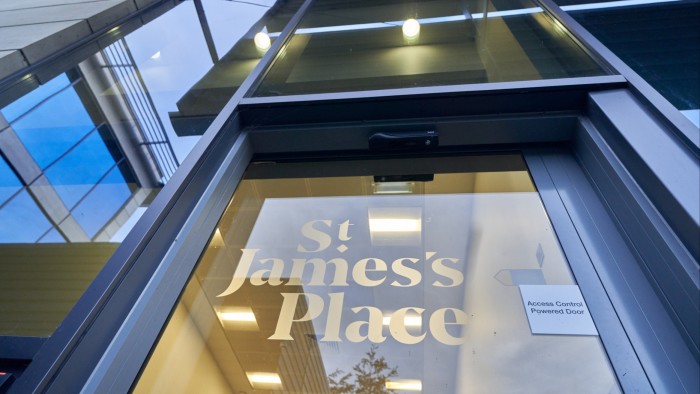Stay informed with free updates
Simply sign up to the Investments myFT Digest — delivered directly to your inbox.
Wealth manager St James’s Place is closing its £1.8bn property funds and exiting the sector after two decades due to “a challenging period”, as some investment experts believe the market for open-ended property funds is “over”.
The UK’s largest retail wealth group said it will wind down three funds comprising its property unit trust, pension and life products. SJP said investors “have remained increasingly cautious” about the asset class due to the Covid-19 pandemic, which reduced demand for office space.
However, the sale of the property investments in the funds could take about two years, SJP warned. The wealth manager said it will return money to investors on a regular basis through this period and has appointed Invesco Real Estate to manage the wind down.
“Since we launched our property funds in 2004, the marketplace and our investment processes have evolved substantially, with the pandemic significantly impacting the wider property market,” said Tom Beal, group investment director at St James’s Place.
“Following the suspension of the fund in October 2023, we have reviewed all options available to us and concluded that the best course of action is to wind down the funds. Doing so over a period of time will allow us to maximise value for our clients.”
SJP decided to freeze the unit trust and defer withdrawals from its life and pension property funds last year, so it would not have to sell the property investments below market value to meet customers’ withdrawal requests.
The wealth manager at the time reduced the annual charge on the unit trust by 0.15 per cent and noted that this fee discount will continue during the wind-down.
Some investment experts believe the market for open-ended funds that invest directly in commercial property is coming to an end, as more products close.
“There has long been a debate: what is the right structure for holding property? The days for open-ended property funds are over,” said Darius McDermott, managing director of Chelsea Financial Services.
He noted that there was a mismatch between open-ended funds that offer investors the ability to withdraw their money quickly and assets that take time to sell, such as property. As a result, a number of funds in the sector have switched to investing in real estate investment trusts and cash as well as direct property.
A number of property funds have had to be frozen in recent years to prevent a fire sale of assets, as the commercial property sector came under strain during the pandemic.
“Most of the physical property funds have either announced they are closing — therefore investors are trapped — or they are converting to a hybrid [of direct property and shares]” said Ben Yearsley, an investment director at consultancy Fairview Investing.
However, he added that commercial property was still an attractive sector and noted that now might be an opportune moment to buy.
“Interest rates have peaked and are falling and inflation is under control,” he said. “It generally provides a good long term income stream with some capital uplift.”
McDermott added that the asset class provides income and diversification away from equities and bonds.
“The investment trust world would have said for a long time that closed-ended structures were not forced to sell and have daily liquidity,” McDermott said.
However, he noted that shares in investment trusts that are out of favour can trade at a large discount to the asset value, adding that commercial property trusts are on average at a 23 per cent discount.
Read the full article here

